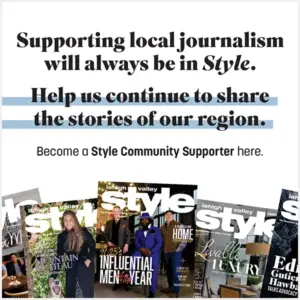The benefits of being in nature are endless. From improved mood and stress reduction to boosted immune function and lower blood pressure, studies have proven that nature can be truly healing. But not all nature is accessible to everyone, especially for individuals with disabilities. Read on to learn more about the healing power of nature, discover accessible local spots and hear how creating awareness and improving access to nature is actually a win for all. Writer Cindy Ross also shares her husband Todd Gladfelter's moving story.
Local Spots
The Lehigh Valley is fortunate to be home to and in proximity of many spots that make nature accessible to all. From adaptive boat launches to accessible fishing docks, and many trails in between, there's much to be explored.
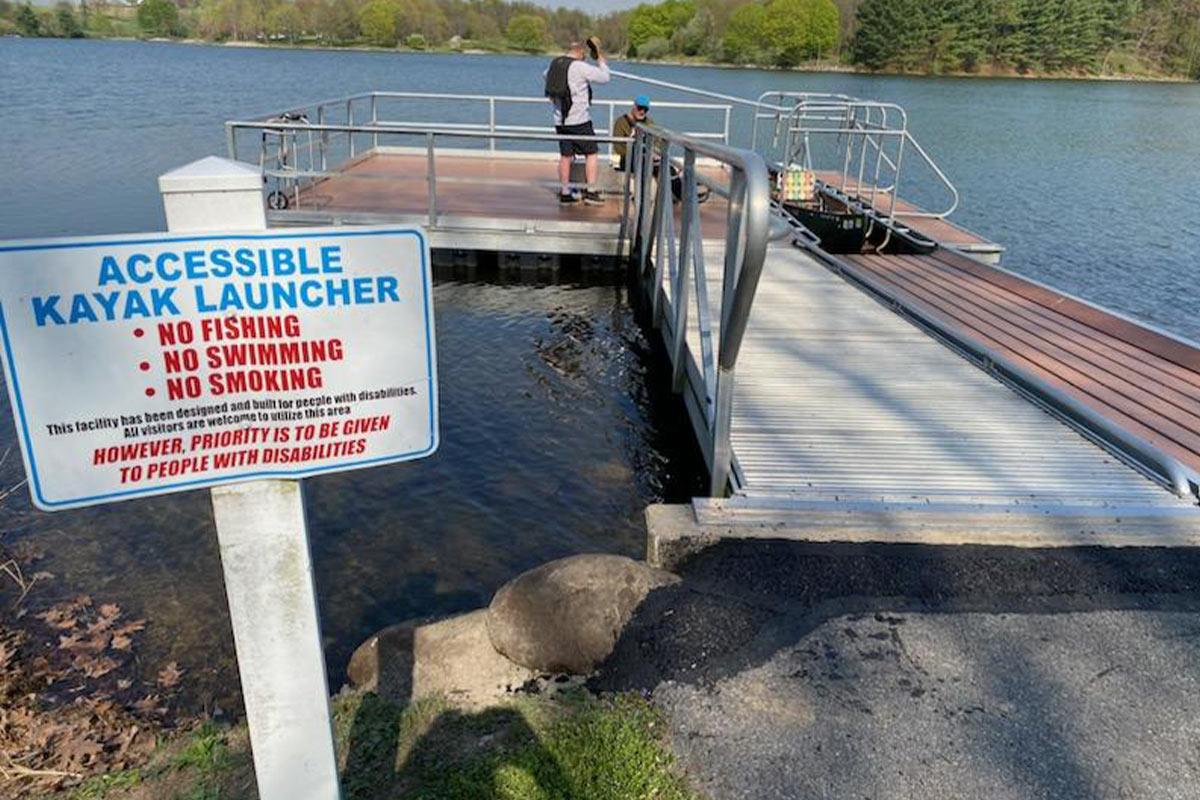
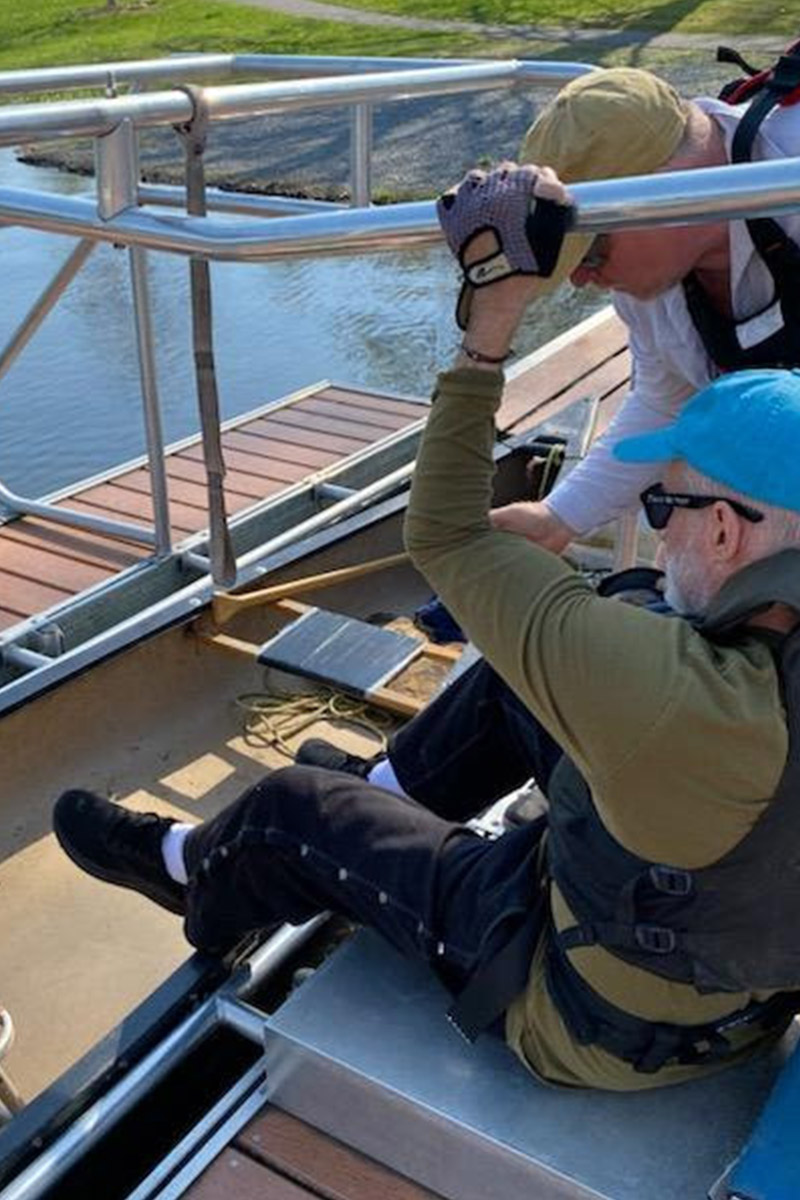
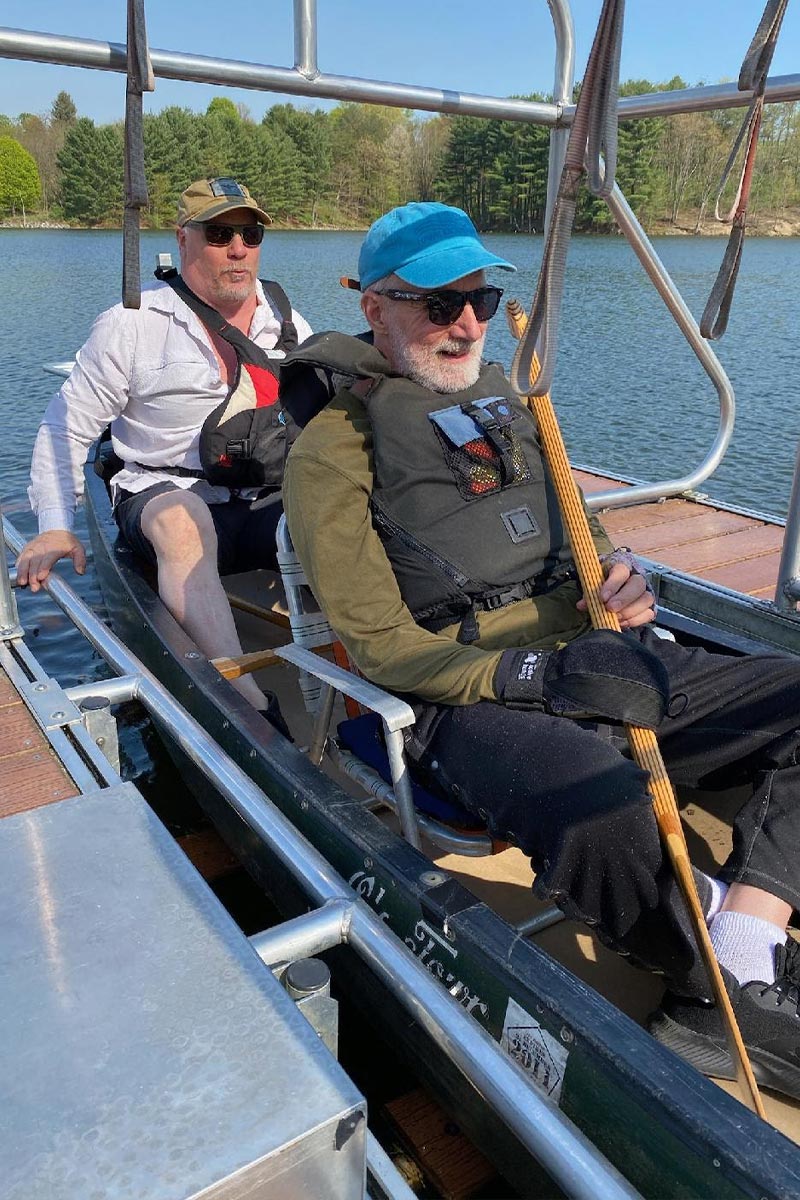
Leaser Lake
It might be a little frightening for a person with a disability to leave the security of their wheelchair and launch themselves onto a lake in a boat, but the adaptive launch at Albany Township's Leaser Lake can make this happen. There are descending blocks to bump down to the aluminum chute, where one's boat sits cradled. Pull out the sliding seat, grab onto the overhead loops, lower into the boat and, with total stability, push oneself out onto the water. For individuals who have the use of their arms, they can even go solo.
The launch ramp was designed and installed by BoardSafe, a local metal fabrication company in Fleetwood, and funded by the Kempton Lions Club as well as the state and national clubs. The dock has been so successful that the company has gone on to build 115 more around America, getting many thousands of individuals with disabilities onto the water.
There is also an accessible fishing dock at Leaser Lake for anglers.
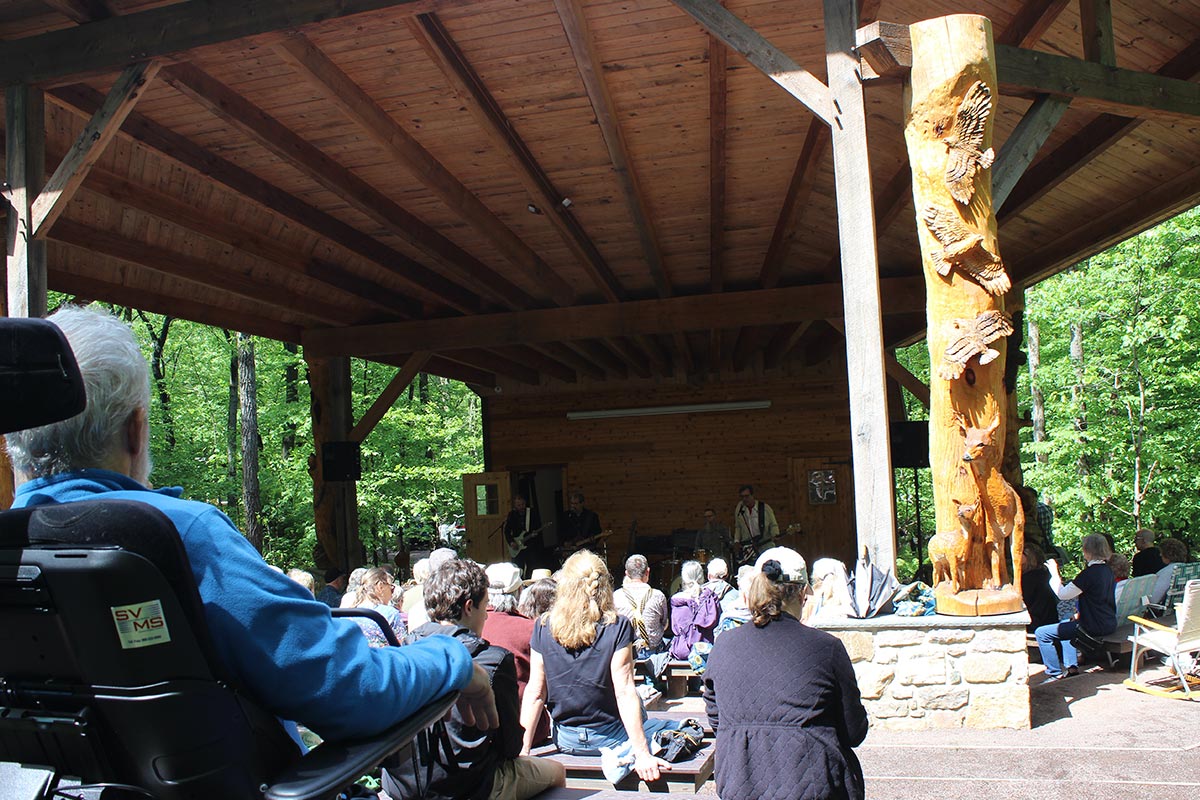
Hawk Mountain Sanctuary
Another local treasure is the accessible trail at Hawk Mountain Sanctuary (HMS), outside Kempton, a few miles from Leaser Lake. This world-class private sanctuary for migrating birds had no accessible way to view the spectacular autumn flight until the six-foot-wide, 900-foot-long accessible Silhouette Trail to the South Lookout was constructed with a grade of less than 8.3 percent. This semi-smooth surface of pressed pebbles has nine benches, with pull bars in the middle, positioned at least 100 feet apart.
At the South Lookout, there is a large, smooth, flat area for viewing with a bench, which can easily accommodate many wheelchairs. The trail to the lookout also has a connection to Laurelwood Niche, an outdoor education center, which is wide enough to accommodate a wheelchair. The trailside restrooms have been upgraded to follow accessibility standards under the Americans with Disabilities Act (ADA). The Native Plant Garden was also made accessible and a short loop takes you to a viewing deck over a small pond. And then there's the magnificent new amphitheater. Thirty-two species of North American wildlife are beautifully carved in the amphitheater's upright log posts. A wheelchair or walker can easily fit between the benches, making viewing of the magnificently carved eagles, hawks, bears, whitetail deer, bobcat and beyond possible for those with limited mobility, and also allows them to enjoy the concerts and talks HMS offers to the public.
Local Trails
Perhaps the best way to access nature in the Lehigh Valley may be the amazing network of smooth, flat, multipurpose trails for walking, wheelchair rolling and cycling. They provide a safe place to move through the outdoors, away from vehicular traffic. There are many types of adaptive bikes, like hand cycles (for those with paraplegia), recumbent foot cycles for folks with stronger legs than upper bodies and adaptive pedals to strap in their feet. For children with disabilities, there are bike trailers.
Palmer Township Recreation Trail
South Bethlehem Greenway
Dorothy Rider Pool
Wildlife Sanctuary
Wildlands Conservancy
Little Lehigh Parkway Trail
Delaware & Lehigh National Heritage Corridor
Albany Township Trail
Forks Township Recreation Trail
Hawk Mountain Sanctuary
Mind & Body
Scientific research suggests that the human brain actually craves green environments and wild places. Being in nature helps shift the brain to the relaxed, calm, focused electrical brain-wave pattern—alpha waves—which helps rewire the brain. Spending time in forests and green natural areas significantly lowers one's pulse, blood pressure and sympathetic nerve activity (the flight-or-fight response). Exercise actually changes the brain by manufacturing natural opioids that dampen pain and replace it with euphoria, as it stimulates the production of serotonin.
Creating Awareness
One in four Americans lives with a disability (61 million, with one million requiring a wheelchair). These disabilities often keep them at home, where they are more comfortable and their lives are safe and have a degree of accessibility. But studies in recent years have found that ecotherapy, simply spending time in nature, is helpful and healing to humans.
The life of a person with a disability can feel very small and limited, besides enormously challenging and difficult. Spending time in the natural world can fill their lives with so much joy and a feeling of great peace, allowing them to feel connected to a larger, more beautiful world. That goes for the caregivers, too, the quiet, unsung tired heroes, holding it all together.
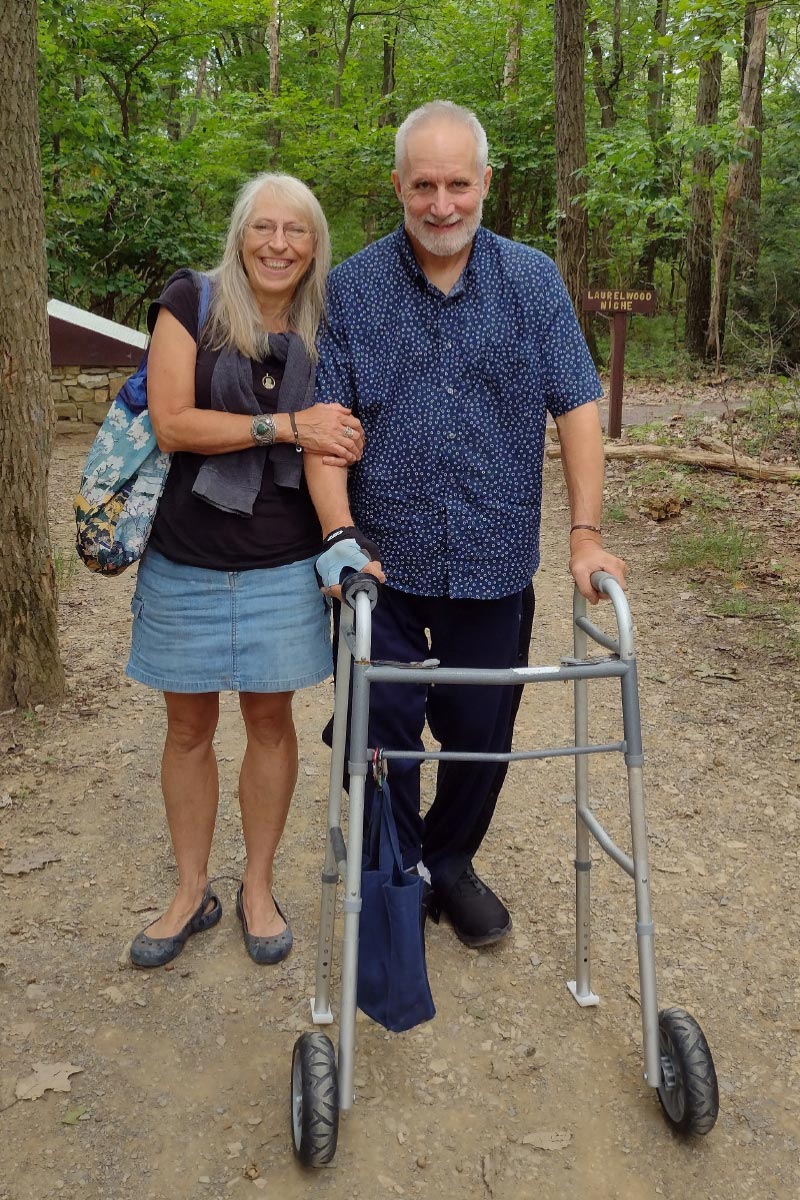
Benefits for Caregivers
Nature is helpful to caregivers, renewing their strength and enabling them to do the very important work of keeping another human being alive and healthy. Very often, their needs fall way below those in their care. Caregiving takes a toll on a person's mental as well as physical health but they must honor their own needs. When a caregiver takes their loved one to a natural area, they reap all of the same benefits. And if they need to get away from the intense workload, an hour-long nature walk alone can work magic in revitalizing and refueling them.
Improving Access to Nature
Presently, there are no accessible guidelines that exist for state or local parks, but Hawk Mountain Sanctuary, right here in the Lehigh Valley, is leading the way and creating a new model for accessibility in outdoor areas. They developed a fully ADA-accessible campus, from the new amphitheater, to the Visitor Center and Native Plant Garden, to the already ADA-accessible Silhouette Trail leading to South Lookout.
Pennsylvania state parks are presently looking at their infrastructure funds to create more accessible launches at their park lakes and are in the process of assessing their trail surfaces and widths to make them more ADA compliant. Even something as simple as installing an accessible port-a-john at trail heads would do much to help.
Putting the needs of those living with disabilities at the center of planning efforts benefits all, as accessible spaces serve everyone. When it comes to enjoying nature, it's important to work together to break down barriers, raise awareness and create a culture of inclusion.
A Local Story
When Todd Gladfelter, a local chainsaw carving artist, carved the upright log posts at Hawk Mountain Sanctuary's amphitheater, he wasn't thinking how accessible the space would be for those with disabilities because he never dreamed he would be in a wheelchair at such a young age.
The amphitheater was completed in 2020, only one short year before Gladfelter had a near-fatal fall that broke
his neck and left him with quadriplegia. Now, Gladfelter visits the amphitheater for concerts and talks, and he appreciates his ability to move around freely. And then there's that accessible trail! At first, Gladfelter motored up to South Lookout in his power chair for a picnic dinner, to watch the sunset and the full moon rise.
Then, Todd Bauman, director of stewardship at HMS, had a vision: to get Gladfelter up to the South Lookout via foot. Intensive physical therapy and incredible hard work resulted in Gladfelter using a walker. Gladfelter practiced walking using the benches on the adaptive trail as goals, until the first day of spring in 2022, just 15 months after he became paralyzed, when he walked all the way to the South Lookout and back, with the support of 75 friends and family and the local news.
As far as cycling goes, Gladfelter rides a recumbent, e-assist trike, and even though he loves his walks and his paddles (on Leaser Lake!), it's on a bike he says
he feels the most “normal.” He is free to look around and take in the peace of the forest, smell the pines, watch colored leaves float down in the autumn and chipmunks scamper across the trail. And he can move fast! There are not many opportunities for a person with a disability to move quickly through their world, under their own power, and feel the thrill of wind and air on their face, but it can happen on a bike on a wide, open trail.
toddgladfelter.com | cindyrosstraveler.com
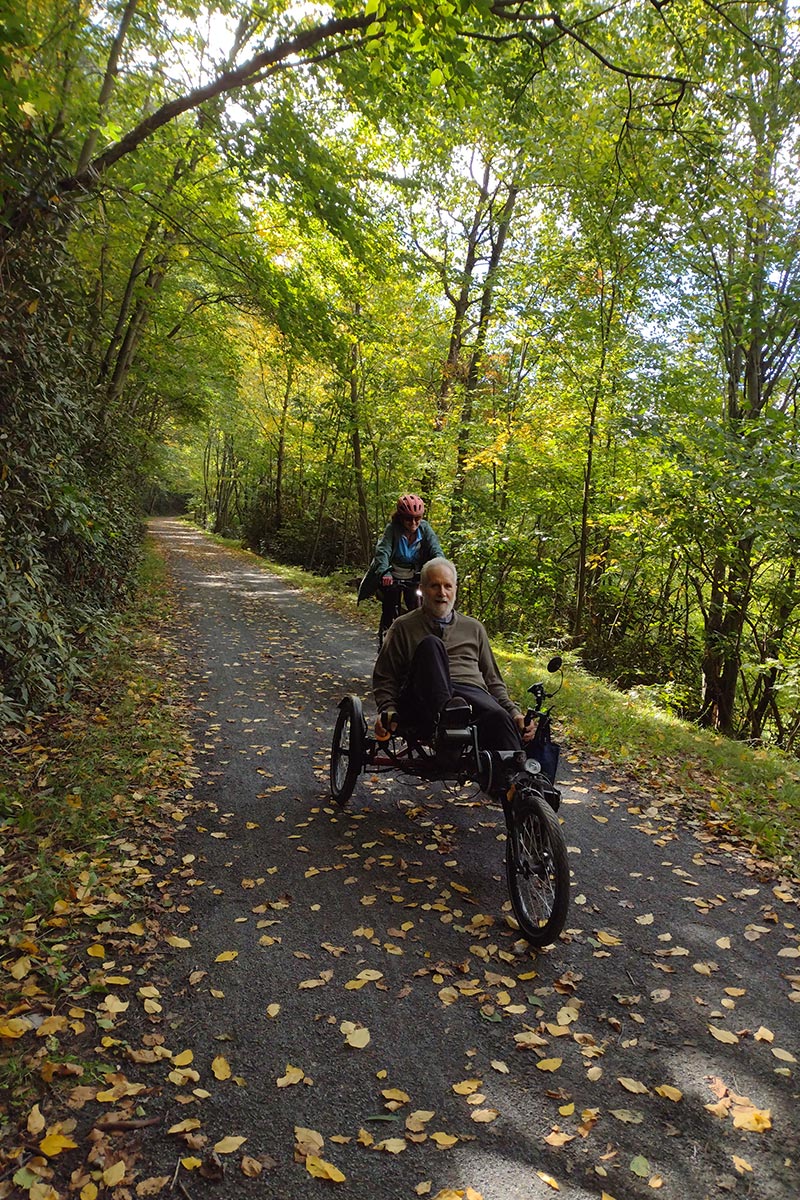
Published as "Accessible Nature: A Win For All" in the April 2024 edition of Lehigh Valley Style magazine.













